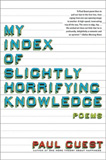Review by Michael Meyerhofer
Ecco Press
HarperCollins Publishers
10 East 53rd Street
New York, NY 10022
ISBN: 978-0061685194
2010, 96 pp., $13.99
www.harpercollins.com
Rarely are we given a book that so elegantly marries intellectual and lyrical acrobatics with the emotional equivalent of matter spooned from a neutron star. My Index of Slightly Horrifying Knowledge, Paul Guest’s third book of poems, affects the senses like an unexpectedly tender burlesque show held in the basement of a speakeasy that once upon a time used to be a church. (And just in case it isn’t clear, I mean that as a compliment.)
The first poem, “User’s Guide to Physical Debilitation,” confronts the author’s paralysis due to a childhood bike accident; and it does so with stunning deftness, blending elevated lyricism, gut-wrenching bluntness, and a surprising dose of gallows humor:
Should the painful condition of irreversible paralysis
last longer than forever or at least until
your death by bowling ball or illegal lawn dart
…
you, or your beleaguered caregiver
should turn to page seven where you can learn,
assuming higher cognitive functions
were not pureed by your selfish misfortune,
how to leave the house for the first time in two years.
Those already familiar with the poetry of Paul Guest know that in the Age of the MFA Program, he is still in a stylistic league of his own, confessional but not quite Confessional, reminiscent of the New York School but not exactly academic (or anti-academic, for that matter). And in the canon of poets with beautifully quotable lines, Guest is as good as anybody, living or dead. The Dallas Morning News (cited on the cover) rightly praises Guest’s first lines, their ability to “zigzag from one eye-opening image to another,” but it’s the final line of “Early in a New Year” that has been haunting me for days:
When I’m quiet and still,
when I stop speaking out
to the motion of the water ringing in the drain,
I listen like a child to the darkness
where monsters sing.
The sheer unexpectedness of this, a poignancy of grief and derision reminiscent of Catcher in the Rye, is just phenomenal. I don’t have a tattoo but if I did, I think those last two lines in particular would make a good addition.
These are extravagantly layered poems–something I normally take as a symptom of emotional distancing, but the layering of Guest’s poems is no mere hipster gimmick; rather, his poems are a textbook example of genuine function mirroring meticulously crafted form.
“Eulogy” reminds me of Tony Hoagland’s famous poem, “Suicide Song,” in that both are sarcastic condemnations of self-destruction counter-balanced with subtle self-indictment and acknowledgement of not only the existence but the sustaining nature of sorrow. In that sense, Guest is irreverently reverent, which I tend to think is exactly the place you want to be. He is also supremely clever with his line breaks:“Tell me where / you were when you heard / but tell me later, much later / the kind of later mathematicians get excited about.”
“One More Theory About Happiness” is another fascinating poem that compares happiness to “an accident / with a powder-actuated nail gun and a man whose arms dead-end / at the bulbs of his elbows / kicking a dog.” Despite tones of bitterness and sardonic humor, this is also a poem that resonates with survival, in which happiness multiplies “with the mythic, sexual frenzy of the rabbit” and the before-mentioned dog-kicking amputee understands, like the Buddha, that “desire is the cause / of all human suffering.” In other words, it’s a poem of duality, neither a defense nor condemnation but a celebration of human frailty and metaphysical contradictions. As the poem’s title also happens to be the title of Guest’s well-praised memoir, one is invited see the same topics explored through these different mediums and in so doing, develop an even greater appreciation for Guest’s distinctive, gutsy style.
It’s sometimes tough to place these poems on the slide rule between cynical and optimistic–precisely because Guest is indirectly pointing out the sheer absurdity of thinking of cynicism and optimism as inflexible polar opposites, rather than hopelessly/hopefully interwoven depending on the time of day. And interestingly enough, given that these poems often incorporate elevated language, there is a refreshing lack of filler; that is to say that reading this book with an editor’s eye, I notice an accessibility and economy of language in Guest’s poetry that one would normally associate with Deep Imagists. I can imagine Guest being unfairly lumped in with more esoteric poets who try to be hip just for the sake of being hip, but in Guest’s case, one gets the distinct feeling that his aesthetic is less a product of style than sheer necessity.
In other words, reading these poems, I can’t imagine them being written in any other way. Guest has effectively created his own form for the task at hand, and in that sense, he deserves as much praise as other luminaries like Walt Whitman, Emily Dickinson, Ann Sexton, Sylvia Plath, Allen Ginsberg, and James Wright who told their story the way they needed to tell it and in so doing, helped bolster and reshape the literary canon for generations to follow.